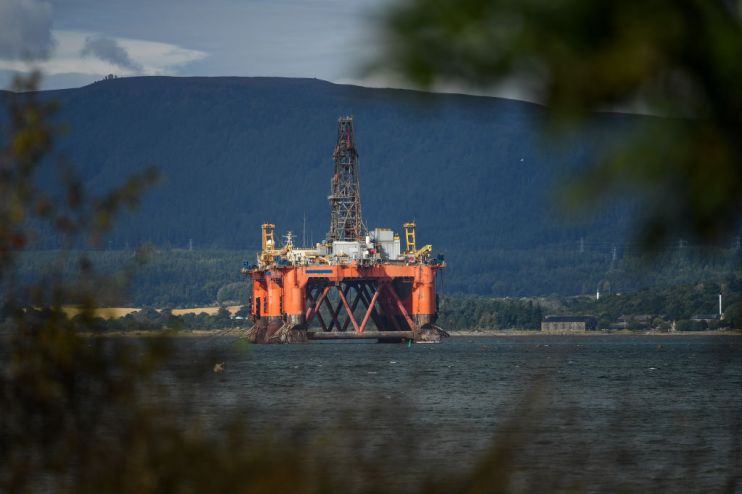Shell warns of investment ‘uncertainty’ amid projections of record North Sea tax revenues

Shell has toughened its stance on the government’s announced levy on North Sea oil and gas operators, warning the new tax will create “uncertainty” within the domestic energy sector.
The energy giant recognised the “worry for millions of people” about high energy costs, and “the need for support to help make ends meet”.
However, Shell argued that sustaining investment in oil and gas supplies was crucial to meeting today’s energy needs.
It also highlighted that proposed investment relief for companies that commit to big spending plans in the domestic energy sector does not currently extend to renewable energy – making the transition to green projects more difficult.
A spokesperson told City A.M.: “In its current form the levy creates uncertainty about the investment climate for North Sea oil and gas for the coming years. And, longer term, the proposed tax reliefs for investment don’t extend to the renewable energy system we want to drive forward in the UK and invest in very substantially. When making plans for the next decade and beyond, we need certainty.”
The government is keen to ramp up domestic energy generation, and has included plans to boost offshore wind from 11 GW to 50 GW by the end of the decade, alongside near-quadrupling nuclear power from 6.9GW to 24GW by 2050 and doubling hydrogen capacity to 10GW over the next eight years.
Shell has committed £25bn to the UK energy sector this decade – with 75 per cent of its spending plans focused on low and zero carbon energy sources.
The more critical stance taken by Shell contrasts with its initial response to the tax, where it praised the central role investment relief played in the proposals.
Rival firm BP has gone one step further with its criticisms, and suggested it could reconsider its plans to invest £18bn in UK energy projects over the coming decade.
A spokesperson told City A.M.: “Naturally we will now need to look at the impact of both the new levy and the tax relief on our North Sea investment plans.”
EnQuest, the 10th biggest operator in the North Sea oil and gas sector is also reportedly considering expanding its presence in South Asia following the increased tax burden.
According to The Sunday Telegraph, it is drawing up plans to expand outside UK waters despite spending £4bn in the domestic energy sector over the past 12 years.
Last week, the Chancellor Rishi Sunak finally unveiled a £15bn support package for struggling energy users, providing up to £1200 savings to some of the UK’s poorest and most vulnerable households.
This follows warnings from regulator Ofgem the price cap could spike to £2,800 per year for average consumers, escalating a cost-of-living crisis that has also seen fuel and food bills soar.
The package is being partly funded by an ‘Energy Profits Levy’, a new 25 per cent tax on the profits of North Sea oil and gas companies.
Alongside the current 40 per cent special rate energy firms operating in the North Sea already pay, this will mean a 65 per cent tax on energy profits.
The measure has been described as “temporary” but could last for up to three years – with a sunset clause in 2025.
During the first three months of trading this year, Shell and BP recorded underlying profits of $9.1bn and $6.2bn respectively – powered by surging oil and gas prices.
This has reignited calls from the Labour Party for a windfall tax to reduce household energy bills – which rose to nearly £2,000 per year last month.
The government has adopted a ‘carrot and stick’ approach with the new levy as it includes an 80 per cent investment allowance which mean businesses will get a 91p tax saving for every £1 they invest.
This nearly doubles the tax relief available and means the more investment a firm makes, the less tax they will pay.
13 billion reasons in favour of a windfall tax
The windfall tax is expected to provide record revenues for The Treasury – with £5bn expected from the first year of the new levy being in operation combined with £7.8bn the Office for Budget (OBR) has forecast will come from its current 40 per cent tax regime.
The £5bn estimate is a combination of predicting an oil price average of $94 per barrel this year, alongside gas prices remaining at £2,80 per therm.
In total, this would mean nearly £13bn in revenue will be squeezed from the North Sea this year, more than at any time since fossil fuel reserves were discovered there over 50 years ago.
Meanwhile, the Institute for Fiscal Studies (IFS) criticised Sunak for making investment allowances in the North Sea too generous – to the point that loss making projects could be viable after tax.
It argued that rather than discouraging investment in the North Sea, a new ‘super-deduction’ means that North Sea investment will be massively subsidised while the higher tax rate is in place.
Stuart Adam, a senior economist at the IFS, said: “The new super-deduction means that investing £100 in the North Sea will cost companies only £8.75, with the remaining cost paid by the government. So a massively loss-making investment could still be profitable after tax. It is hard to see why the government should provide such huge tax subsidies and thereby incentivise even economically unviable projects.”
When approached for comment, a Treasury spokesperson told City A.M.: “As set out in the British Energy Security Strategy, and with Putin’s invasion of Ukraine illustrating the merit of this, North sea oil and gas are going to be crucial to the UK’s domestic energy supply and security for the foreseeable future – so it is right we continue to encourage investment there.”
The Treasury also suggested there were already incentives to bolster green energy, such as the super-deduction, the R&D tax relief regime and the contracts for difference scheme.